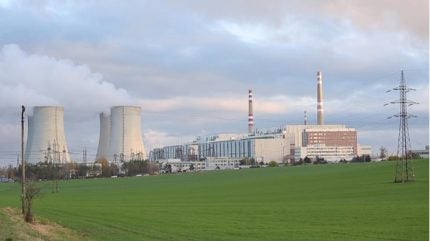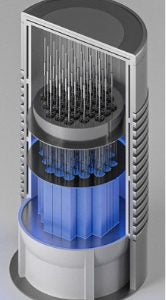
A South Korean consortium led by the state-run Korea Hydro & Nuclear Power (KHNP) has been selected as the preferred bidder for the construction of up to four NPP units in the Czech Republic. The other contender was France’s EDF. US-based Westinghouse Electric had been excluded from the tender in January, because it “did not meet the necessary conditions”. The Czech government announced KHNP as the winner following a Cabinet meeting.
Elektrárna Dukovany II (EDU II), a wholly owned subsidiary of Czech state-owned power company ČEZ, in June submitted to the he Ministry of Industry & Trade (MIT) its evaluation of offers from the interested companies for construction of up to four nuclear units at the Dukovany and Temelín NPPs, proposing its preferred supplier. EDF and KHNP had submitted documents at the end of April. In January, the government had amended the tender to binding offers for up to four reactors, rather than just one as specified in the original tender. EDF offered its EPR1200 reactor and KHNP its APR1000. Westinghouse had offered its AP1000.
In the previous months, more than 180 experts from ČEZ Group and other organisations scrutinised the bids, evaluating the financial, commercial, and technical aspects. “The bid evaluation model was based on recommendations of the International Atomic Energy Agency (IAEA),” said Board Member and head of ČEZ’s New Energy Division Tomáš Pleskač. “All price inputs and risks have been quantified. Both offers were compared according to the same criterion, namely to the price per one megawatt hour generated, at which each contender’s new unit would generate electricity.”
Earlier in July, President Yoon had discussed the Dukovany project with Czech President Petr Pavel during bilateral talks on the sidelines of the NATO summit in Washington. “Financial support is available through the Export-Import Bank of Korea and Korea Trade Insurance Corp,” Yoon said at that time. ČEZ has agreed a financing model with the government for the construction of the first new unit at Dukovany, including low-interest loans and a scheme for pricing of produced electricity – a contract for difference – to guarantee ČEZ a return on the project. The European Commission has approved the use of state aid for building the first unit.
The Czech authorities intend to finalise the contract for the two Dukovany units by March 2025. Elektrárna Dukovany II plans to begin construction of the the first unit at Dukovany in 2029, with the commissioning slated for 2036.
Meanwhile, EDU II is working on other parts of the project. After the Ministry of the Environment issued an affirmative environmental impact assessment in 2019, the project also received a siting permit from the State Authority for Nuclear Safety, and authorisation from the Ministry of Industry & Trade. A zoning permit that is not yet final was issued in October 2023.
The South Korean consortium comprises KHNP, Doosan Enerbility and Daewoo Engineering & Construction, as well as affiliates of the state-owned Korea Electric Power Corp (Kepco) including Kepco Engineering & Construction.
The consortium is expected to negotiate further with ČEZ before signing a formal deal to build two 1,000 MWe units at the Dukovany, NPP. The construction cost of the two units is estimated at KRW24,000bn ($17.4bn). The consortium also has the exclusive right to a contract for two more units at the Temelin NPP.
President Yoon Suk Yeol’s office welcomed the announcement by the Czech government as an outcome of the “Team Korea spirit” through which South Korea’s public and private sector had joined forces. Sung Tae-yoon, director of national policy at the presidential office, said the deal will open the doors for South Korean nuclear exports to Europe. Sung added the value of the project will be finalised at the time of the signing of documents.
Korea Times cited a ranking government official as saying: “With advanced technology, Korea gained the upper hand over the French firm by offering a lower price and high quality.” ČEZ CEO and Chairman Daniel Beneš, noted: “We have a clearly defined schedule, which provides for a fixed date for the start and completion of construction, and it is important for us that the selected contractor commits to it under the threat of sanctions. The offer of the preferred bidder was more satisfactory in this respect.”
Czech Minister of Industry & Trade Jozef Síkela said “it is clear that the preferred bidder offered a better price and more reliable guarantees of cost control, as well as the schedule of the entire project”. Prime Minister Petr Fiala told a news conference that the Korean offer “was better practically in all assessed criteria”. He added: “Our goal was to come up with a solution that would be economically rational and ensure enough energy at an acceptable price. The offer of the Korean company KHNP meets these parameters. At the same time, it will bring a significant impetus to the development of the Czech economy thanks to the involvement of Czech industry to the extent of approximately 60%.”
This will be South Korea’s biggest NPP deal since its first export order in 2009 when it won the contract to build four APR-1400 reactor units in the United Arab Emirates. Three of the four units at the Barakah NPP are already operating with unit 4 scheduled to begin commercial operation s later this year. The APR-1000 offered to the Czech Republic is based on the APR-1400, but modified to meet local demand, including a reduced capacity. In 2022, KHNP also won a $2.2bn contract for construction of the turbine islands at the El Dabaa NPP being constructed by Rosatom in Egypt.
However, Westinghouse is threatening continued legal action in the wake of the Czech announcement. “Westinghouse reserves its rights to challenge this in front of the relevant national and international jurisdictions,” it said in an emailed statement. Westinghouse reaffirmed its view that “KHNP is not authorised to use Westinghouse reactor technology… without Westinghouse’s agreement”. It says KHNP had failed to comply with US export control rules, which require “authorisation from the US government before sharing technology beyond the agreed to Korea transfer”.
This is an extension of an ongoing legal battle between the two companies. Westinghouse in October 2022 alleged that Korea’s APR1400 reactors copied the System 80 reactor designed by Combustion Engineering, which was acquired by Westinghouse in 2000. The litigation was a move by Westinghouse to stop the Korean companies from selling reactors to Poland, which was then evaluating offers from Westinghouse, KHNP and EDF to supply its first commercial NPP. Although Westinghouse won that tender, Korea subsequently signed an agreement with a private Polish companies ZE PAK and PGE (Polska Grupa Energetyczna) to supply its APR1400 reactors at another site.
Westinghouse filed the suit to prevent the Korean companies from transferring technical information on reactor designs, which it claims have been licensed by it, to Poland and other countries under a US export control regulation, known as Part 810. This details regulations governing the transfer of technology for development, production or use of nuclear reactors, equipment and materials. Westinghouse insists that the Korean companies are using its technologies and need to obtain the approval of the US government before exporting them to a third country.
Korea, on the other hand, claimed that, while early development of its reactor technology was supported by Westinghouse, the current models it is seeking to export were developed using its own technologies and are not subject to US restrictions. KHNP says the company has developed original reactor technology over the past 30 years and now owns the intellectual property rights to its nuclear power plant technology.
KHNP has filed countersuits claiming that the US Atomic Energy Act grants authority to enforce the law exclusively to the US Attorney General and not to entities seeking to claim rights through litigation.






